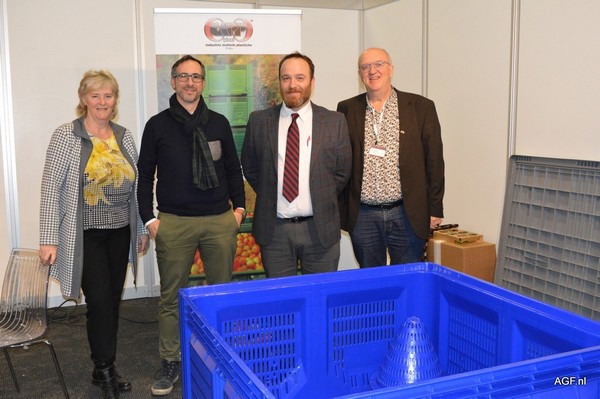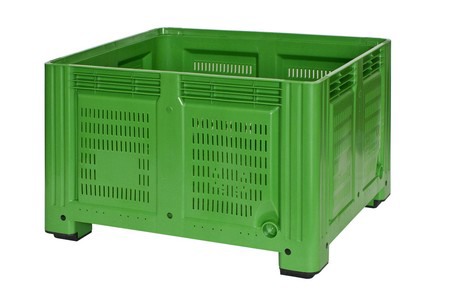Are plastic pallet boxes a more sustainable solution than wooden crates? According to Gerald Langerak, representative of the Italian Capp Plast for the Northern European market, there is no doubt about it. But then of course these boxes do not have to be driven all the way from Italy, so Capp Plast opened a production site two years ago in Helmond for the northern European market. This makes Capp-Plast the only producer in the Netherlands of these large fruit and vegetable boxes.
 The Capp-Plast team
The Capp-Plast team
"Logistics has been an issue in the past," says Gerald. “The boxes come in different sizes, but when we talk about the most sold box, it is a box of 120 x 100 cm and around 700 litres capacity. Because you can only transport a limited number of boxes per truck, a location in the Netherlands was a logical choice. This means that transport costs are lower for fruit growers in the Netherlands and Belgium, but also further afield in Poland, the UK, Germany and Scandinavia. "
The application of single-use plastic is avoided as much as possible in the supermarket, but for companies with bulk storage that is a completely different story. "Unlike wood, plastic has a number of major advantages in this application," says Gerald.
“Firstly, sustainability: Capp Plast's boxes last much longer than wooden crates and can also be fully recycled and reused. Secondly, it is more hygienic and safer because the boxes can be cleaned very well. With wooden crates you run the risk of wood splinters and pathogens that soak into the boards and those germs can be very hard to remove or kill. Thirdly, they are also more user-friendly because you can simply leave them outside and they are lighter than wood. In addition, our boxes are perforated in a product-friendly manner, so there is less chance of damage to the fruit. The boxes can be produced in various sizes with 4 feet or 2 or 3 slats. Logo, chip and barcode are available as well as various colours for the box and the feet. Capp-Plast gives a 5-year guarantee on production errors. That is unique; nobody else does that. And if they are still intact after 5 years, they will last a very long time under normal use."

Product-friendly perforation in the box
“Capp-Plast is a real family business, now in its third generation. Plastic boxes, crates and pallets have been made in Prato for 60 years, and for decades for the European fruit growers. The quality of the boxes is partly due to the correct choice of raw materials and the method of injection moulding. The Italians have mastered that perfectly. "
“We will initially focus on apple and pear growers who are increasingly exchanging these wooden boxes for plastic, but I also see opportunities for seed potatoes, carrots, chicory, flower bulbs and onions. The organic growers are proponents of the use of our boxes. And if there is an interest in new designs, Capp-Plast has its own R&D department for developing, adapting or producing new concepts."
For more information:
Gerald Langerak
Capp-Plast Nederland BV 
Mob: 0031 (0) 6-51914888
info@geraldgreensupport.nl
